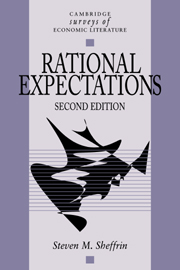Book contents
Preface to the first edition
Published online by Cambridge University Press: 05 June 2012
Summary
More than most areas in economics, macroeconomics has been in a state of flux during the past decade, partly because of the rather poor performance of the economy, which naturally created a spirit of unrest. Perhaps of more importance was the academic quest to redevelop the foundations of macroeconomics that occupied the time of so many scholars. The development of the body of thought associated with the term “rational expectations” was an outcome of this effort.
Despite the impact that rational expectations has had in the development of macroeconomic theory, to most economists it still appears to be an extreme and controversial set of ideas with only little “policy relevance.” Indeed, a substantial number (a majority?) of macroeconomists also share this position.
This book takes the opposite point of view. Its basic thesis is that the work on rational expectations has not only been important for understanding macroeconomics and financial markets but has fundamental and striking implications for other areas as well. This does not mean that, at present, there is a substantive consensus in macroeconomics – there is not. But the process of rethinking macroeconomic theory has had a pronounced influence on the methods and questions in the field, which, in turn, will influence economic inquiry in other areas.
As a survey of the subject, this book attempts to take a balanced view of the work associated with rational expectations. It begins, in the first chapter, with a broad discussion of the concept and the a priori case for the use of rational expectations in economic analysis.
- Type
- Chapter
- Information
- Rational Expectations , pp. xi - xiiPublisher: Cambridge University PressPrint publication year: 1996

